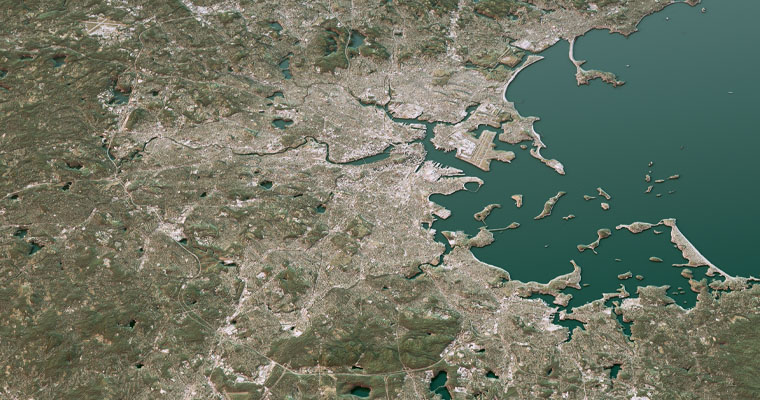Climate Justice Research Grant Winners Announced
The Sustainable Solutions Lab at UMass Boston has awarded two research grants to project teams that will focus on groups that are often overlooked when evaluating the impacts of climate change.

“ We are thrilled to announce the grantees and eagerly anticipate seeing their projects come to fruition. ”
These projects are led by interdisciplinary teams of faculty members affiliated with the lab’s partner colleges, schools, and institutes. As climate impacts become more and more severe, the Sustainable Solutions Lab is working to expand research literature that speaks to the needs of those most vulnerable to climate change.
“We received remarkable proposals from faculty committed to our vision of a future in which the effects of climate change do not exacerbate current racial, economic, and other social inequities,” said Rebecca Herst, director of the Sustainable Solutions Lab. “We are thrilled to announce the grantees and eagerly anticipate seeing their projects come to fruition.”
A grant for $40,000 was awarded to an interdisciplinary study of traditional ecological knowledge and climate change adaptations among the Indigenous peoples of New England and Quintana Roo, Mexico.
The research team includes Camille Curtis Martinez, lecturer in communication, College of Liberal Arts; José Martínez-Reyes, associate professor of anthropology, College of Liberal Arts and School for the Environment; C. Eduardo Siqueira, associate professor of urban planning and community development, School for the Environment; and Cedric Woods, director of the Institute for New England Native American Studies, and director of the Critical Ethnic and Community Studies Program, College of Liberal Arts.
“Indigenous peoples are both at the frontline of experiencing the impacts of climate change and in searching for innovative solutions,” said Woods. “We are excited to apply our climate justice research grant funds to learning from these communities.”
A grant of $48,000 was awarded to a research project that will characterize the current status and vulnerability of transient populations (homeless citizens and seasonal international visa workers) within the context of climate-related risks, focusing on Boston and Cape Cod, Massachusetts. The research team includes Ellen Douglas, associate dean and professor of hydrology, School for the Environment; Johnna Flahive, graduate student, School for the Environment; and Evan Stewart, assistant professor of sociology, College of Liberal Arts.
“To our knowledge, little research has been done to identify historical barriers to and future opportunities for involving transient populations in planning for hazardous climate events,” said Douglas. “Our goal is to produce practical guidance that can inform regional initiatives to protect this highly vulnerable group.”
In addition to climate justice research grants, the Sustainable Solutions Lab has a seed grant program that offers awards of up to $7,500, and the request for proposals is now open. Proposals are due by March 29, 2021. This year, we are particularly interested in proposals that draw connections between the impacts of the COVID-19 pandemic and impacts of climate change. As in prior years, each grant proposal must clearly articulate how the work is related to climate justice.
Awards are open to interdisciplinary teams of tenure or non-tenure track faculty members who are affiliated with the colleges, schools, and institutes that make up the Sustainable Solutions Lab. In addition to funding, faculty who are chosen for the seed grant will receive support from the Sustainable Solutions Lab on proposal development, media outreach, connections to local stakeholders and climate justice leaders and, potentially, connections to foundations and funders. For more information, please email ssl@umb.edu.
About Sustainable Solutions Lab
The Sustainable Solutions Lab at UMass Boston is an applied research and action center working at the intersection of climate and equity. SSL’s mission is to understand the disproportionate impacts of climate change on marginalized communities and work with them to develop sustainable and equitable solutions. We are a groundbreaking, cross-disciplinary partnership of five schools and four institutes across the University: the Collaborative of Asian American, Native American, Latino, and African American Institutes (CANALA), College of Liberal Arts, College of Management, College of Nursing and Health Sciences, John W. McCormack Graduate School of Policy and Global Studies, and School for the Environment. For more information: visit www.umb.edu/ssl.
